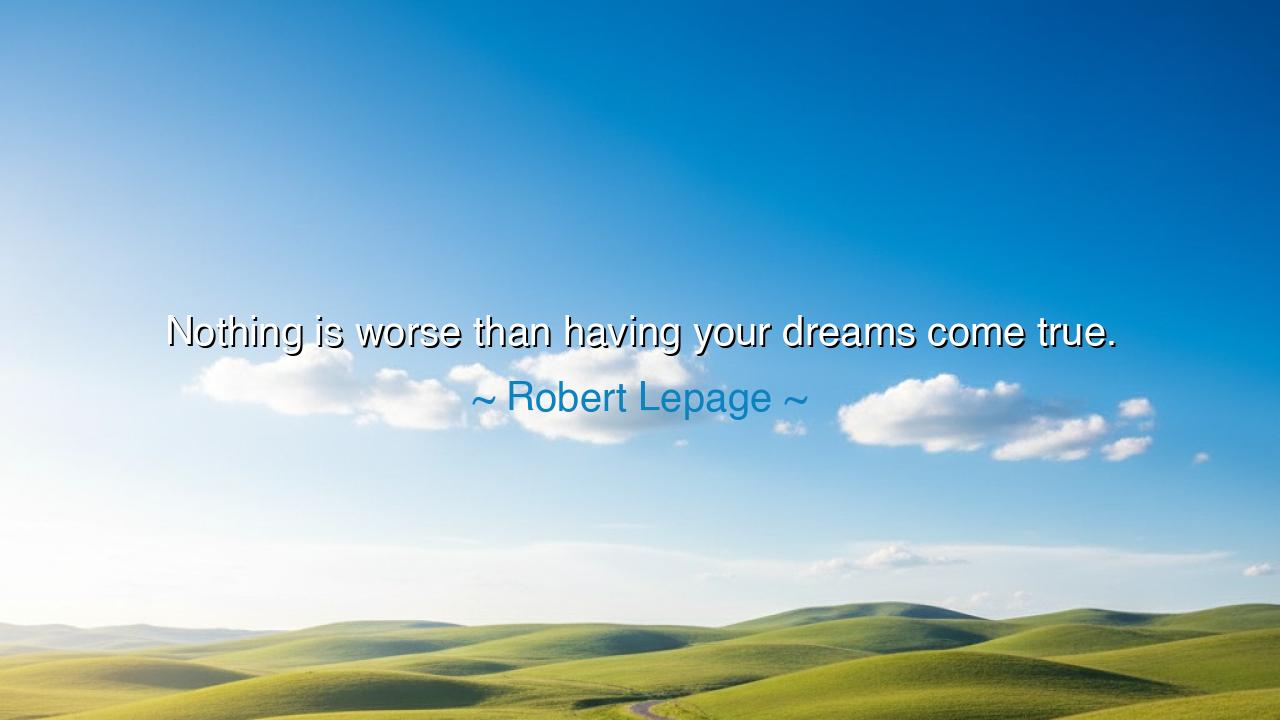
Nothing is worse than having your dreams come true.






In the haunting and paradoxical words of Robert Lepage, the visionary playwright and artist, we find a riddle of the human spirit: “Nothing is worse than having your dreams come true.” To the unreflective ear, this may sound like folly — for do we not spend our lives striving toward the fulfillment of our dreams? Yet Lepage, who has dwelled long in the realms of art and imagination, speaks from the deeper wisdom of experience. His words are not a rejection of ambition, but a revelation of its secret cost. For when the dream becomes real, it often sheds its mystery, and the fire that once drove the soul begins to fade into ashes of disillusionment.
The origin of this quote lies in Lepage’s reflections on the creative life — a path where the pursuit of vision is often more intoxicating than its arrival. As an artist, he understood that dreams are not mere goals to be reached, but living forces that sustain the soul through struggle, longing, and growth. When a dream is fulfilled, its purpose dissolves, leaving behind an unexpected emptiness. In that moment, one sees the truth that desire itself is the breath of life — that without something yet to reach for, the heart grows still. Thus, his words are both lament and warning: that satisfaction, if it comes without renewal, can be a subtle kind of death.
This truth has echoed through the stories of humankind since the dawn of time. Consider the tale of Alexander the Great, who conquered the known world before reaching the age of thirty. When there were no more lands to claim, he wept, saying, “There are no more worlds to conquer.” His dream, which had driven him like a divine flame, was fulfilled — and in that fulfillment, it perished. Without challenge or purpose, his spirit faltered. So it is with all who reach their summits too soon or too completely. The mountain climber who stands atop the peak feels, for a moment, the glory of triumph — but then must face the vast silence beyond, asking, “What now?” Lepage’s words echo through such moments — that even victory carries the seed of loss.
To say that “nothing is worse than having your dreams come true” is to understand that life’s beauty lies in its striving. The dream, when distant, gives meaning to our labor, courage to our fear, and direction to our wandering. It fills our nights with vision and our days with purpose. But once attained, if it is not transformed into a new horizon, it becomes a mirror — one that reflects our own limitations. What once seemed infinite now feels small, what once was sacred becomes ordinary. It is not the dream that betrays us, but our failure to renew it — to turn fulfillment into the seed of another quest.
In the ancient myths, even the gods feared the end of striving. Prometheus stole fire for humankind because he saw in their endless reaching a reflection of the divine. Yet the mortals who gained what they desired — eternal youth, endless wealth, or absolute power — were often cursed by the very things they attained. King Midas, who wished that all he touched would turn to gold, discovered soon that the realization of his dream was ruin. So too does Lepage’s wisdom flow from the same well: that the dream must remain alive, not as possession, but as pursuit.
The lesson, then, is not to abandon dreaming, but to understand its rhythm. When you reach one summit, seek the next. When a dream is fulfilled, let it become the foundation of another. Do not cling to the joy of achievement, for it will turn to dust in your grasp. Instead, dwell in the sacred state of becoming — where imagination always outpaces attainment, and the horizon forever recedes before you. This is not failure; it is the essence of growth. The wise do not dream to arrive; they dream to awaken.
So, my child of wonder and will, remember Lepage’s words when success tempts you to rest or despair. Rejoice in your achievements, but do not mistake them for endings. Life is not a single dream fulfilled, but a thousand reborn. Guard the fire of your longing; feed it with curiosity, with courage, with humility. For it is better to walk forever toward the dawn than to sit still beneath a sun that no longer rises. In this way, you will never outlive your purpose — for your dreams, like the stars, will guide you endlessly forward, bright and untouchable.






AAdministratorAdministrator
Welcome, honored guests. Please leave a comment, we will respond soon